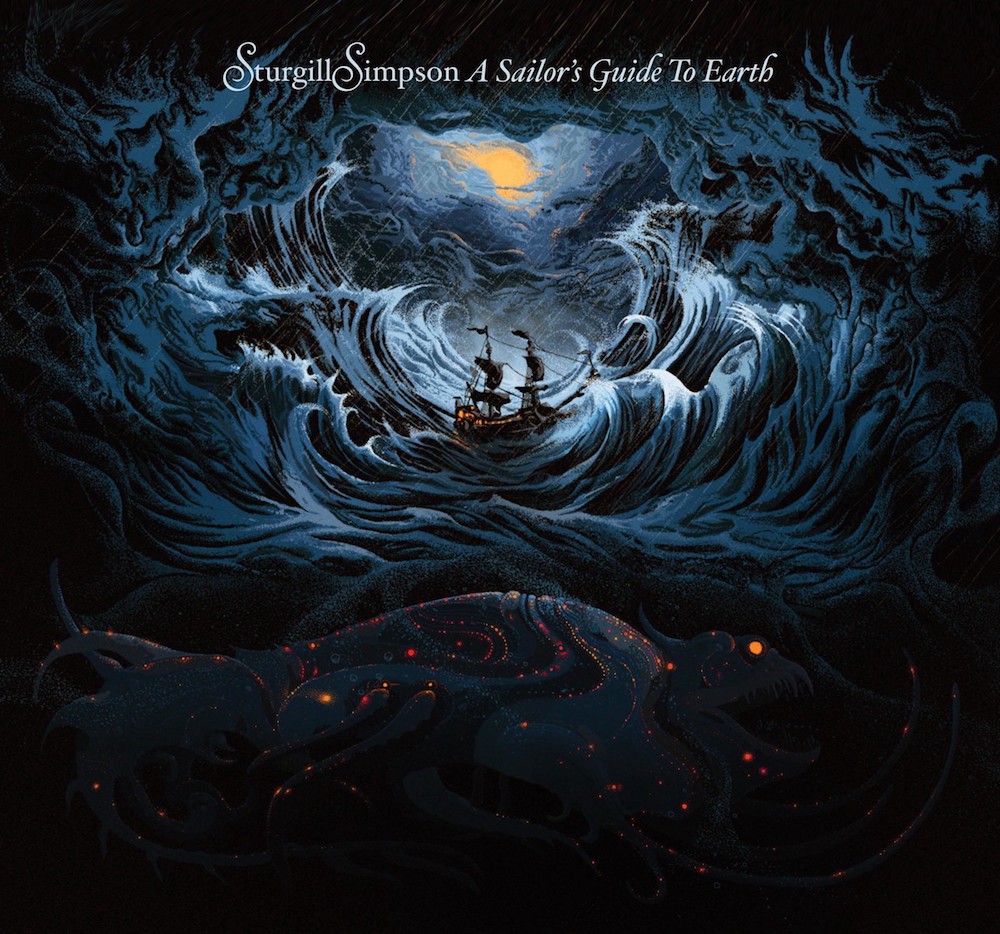A Universal Heart
by Casey N. Cep

Ulysses was gone for twenty years, but Sturgill Simpson has returned after only two. If High Top Mountain was his hillbilly Iliad and Metamodern Sounds in Country Music his alt-country Odyssey then this new album is his attempt at Ulysses Unplugged: enemies defeated, transgressions forgiven if not forgotten, this cowboy has almost made it home to his wife and child, and wants only to tell them how much he missed them. A Sailor’s Guide to Earth sounds like it was written with the shoreline in view, and its opening words — “Hello, my son” — are the invocation of a series of songs addressed directly to the family who has waited so faithfully for this sailor’s return.
Sturgill Simpson had his Friday nights, and his Saturday nights, too, and he told us all about them in his first two albums, but this new one is the work of a man who has scrubbed his hands, shined his boots, and put on his Sunday best. The grime and grease of his early work has mostly been washed away, though Simpson’s voice sounds like bleach smells: clean, but chemical. This album is all bright, shiny strings and horns, including those of the Dap Kings, borrowed from Amy Winehouse and Sharon Jones, but even those bold, brassy companions are overwhelmed by his honky-tonk sound. Simpson might be wearing a tuxedo, but it’s still made of denim.
The album’s first song, “Welcome to Earth,” has over a minute of seagulls and ringing buoys, sloshing seas and piano keys before those first words of dedication. Seven songs later is a gorgeous, uxorious one with a full minute of instrumentation that sounds like a beating heart and then pacing feet before finally, “Oh, Sarah, here we go again / I can’t get past the pain of what I want to say to you.” The addressee is Simpson’s wife, and she’s traced a deep, dark widow’s walk over all the years she’s waited for him, replying to his worried words with her own worry about their life together: “If there’s something I should know then tell me now / Before I go and give my heart away / So I can get on with my life and you can go on with your strife.” Wife is the obvious, but forsaken rhyme. None of these songs are lullabies or nursery rhymes, they’re emotional anatomy lessons (“Bone breaks and heals / Oh, but heartaches can kill,” “the gut don’t never lie,” or “Bones turn brittle / And skin withers before your eyes”) and honest family histories (“Grandfather always said God’s a fisherman / And now I know the reason why,” “I’ve got sea stories / They’re all true,” or “time slips away / Skies fall apart”).
Simpson is writing in the tradition of fathers giving advice to their sons that goes all the way back to Adam. It’s a tradition whose best recent expression is Jason Isbell’s “Outfit,” but that gets regular play on country radio in slightly lesser forms, cycle-of-life numbers like George Strait’s “Best Day,” Trace Atkins’s “You’re Gonna Miss This,” Alan Jackson’s “Drive,” even Reba McEntire’s “Cowgirls Don’t Cry.” Those songs often lose their way, drowning in the Charybdis of corniness or drifting into the Scylla of sentimentality, but Simpson mostly manages to steer clear of both.
An expert sailor, his own time in the Navy appears here as allusions to places like Dam Neck and other ports of call; a rescued soul, his own shipwrecks are mentioned like storms that have come and gone. There’s no denying the depressions and the drugs, but this album bats them away for a better view of his family and his future. Part of what keeps Simpson on course is that this album really does shuffle between a daddy, a pollywog, and a papaw. It’s so cradle-to-grave that even when he’s talking directly to his young son, he’s also pointing directly at death: “Some scream like a baby and some go out crying / Some bid the world goodbye and welcome the dying.”
The kind of someone his son will become is what most concerns Simpson, and that’s why he doesn’t only sing vaguely of sirens and gods, but very specifically of motor oil and baseballs, fighting cobras and boxing rings, James Bond and Nintendo 64, rap sheets and the kick of addiction. He’s made a record of all his son needs to know if and when Simpson himself isn’t around, including a cover of the Nirvana song “In Bloom” that’s like Kurt Cobain forced to wear a cowboy hat and flannel shirt, tied to a bale of straw, made to drink moonshine from a Mason Jar. It’s the most Daaaaaad moment on the album, but I loved it, and so will you because like all the other songs, it’s the sound of a father who’d just as soon be a fool for his son than be cool, a husband who’d rather be honest with his wife than hip. A Sailor’s Guide to Earth is the work of an artist who cares more about his family than he does any audience, and that only makes us love him more.
